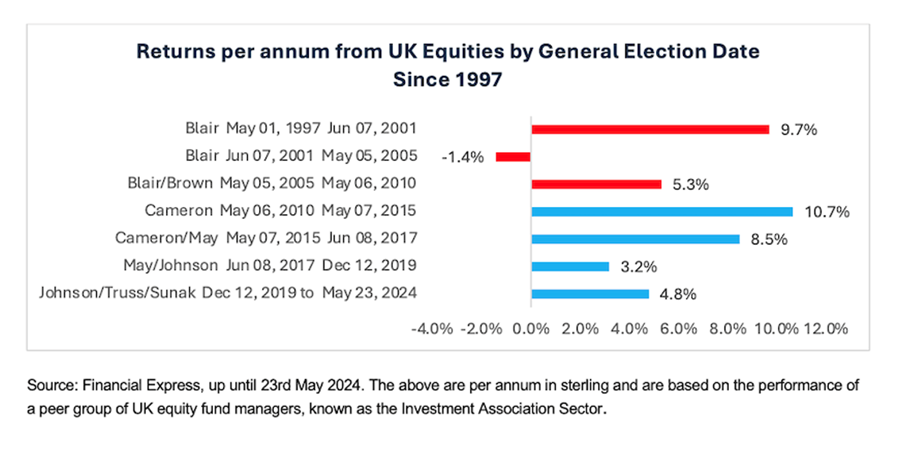As election season unfolds, it’s hard to escape the coverage. Our TV screens, newspapers and social media channels are awash with campaign-related content.
Thankfully there have been plenty of light-hearted moments along the way. That first rain-soaked announcement outside No. 10 by PM Rishi Sunak seemed to set the tone: from then on there have been gaffes, photobombs and bad-tempered TV debates a plenty.
But while we may be glad of the entertainment, any potential political change inevitably raises questions for investors. You might be wondering about the influence of politics on the markets and on your portfolio.

It's natural to feel a bit uneasy. But on the whole, while markets can get a bit panicky over the impact of elections, the situation for our investments is often less daunting than it appears.
The market's reaction to elections
It’s true that politics can impact the markets. A change of policy, new regulation, or a tax increase can push share prices up or down.
However, when looking at this through a more long-term lens, volatility is only temporary.
This behaviour is a reminder that markets are influenced by a myriad of factors, not just political events.
Take the below chart as an example of this. Research firm Fundhouse has examined the impact of general elections on the UK equity market since Tony Blair was first elected in 1997. According to their chart, the only session when annual returns of UK Investment Association fund managers fell was in Blair’s second spell in charge between 2001 and 2005 (Blair’s time in office coincided with both the growth of, and bursting of, the tech bubble).
Despite other parliaments including the Brexit referendum, Covid, and the Global Financial Crisis, markets still went up.
Of course, this is just one example, but it shows that on the face of it, the party in charge doesn’t necessarily have a direct impact on returns.

Economy, tax and spending
Specific sectors might see a boost if a particular policy goes their way, such as promises to build more homes. They can also suffer if a policy goes against them, such as pledges for windfall taxes on energy companies. Whoever wins will have the chance to make big calls on the direction the nation takes over the next few years.
In recent days Labour has promised £7.4bn of tax rises, including a pledge to levy VAT on private school fees and one to widen the windfall tax on oil and gas companies. It also says it wants to permanently close what the party refers to as non-dom ‘loopholes’. That pays for just £4.8bn in new spending, which will pay for more teachers and nurses as well as green investment.
Meanwhile, the Conservatives have said they are the only party that is committed to keeping taxes low. They said they’re planning to cut £17bn in taxes, mainly by reducing the rate of national insurance. But they’ve been less specific on how they will raise that money, for example promising £12bn of unspecified welfare reductions.
We’ll be watching closely to see what impact – short or long term – any new policies could have, and we’ll be back in touch to update you if we do see something that could shift the dial for your finances.
The bigger picture
The financial plans we’ve created for you have been built to withstand short-term market disturbances, so it's crucial to stay focused on long-term goals and not get swayed by the noise.
Key points to remember:
- Historical perspective: Whether it's a new political party, a presidential race or a significant legislative change, the market has a proven track record of resilience.
- Diversification: A well-diversified portfolio is designed to mitigate risks associated with political and economic uncertainties. By spreading investments across various asset classes, we protect you from significant losses in any single area.
- Professional guidance: We’re always on hand to help you maintain a balanced perspective, ensuring that any decisions made are based on sound financial principles rather than emotional reactions to election news.
- Long-term vision: Successful investing is about patience and discipline. Short-term market movements, including those triggered by elections, should not derail a long-term investment strategy.
While the ongoing election coverage can be a source of concern (as well as amusement) it's essential to remember that your investments are designed to weather these periods of uncertainty. By staying informed, diversified, and focused on long-term goals, we can help you to navigate the election season with confidence.
If you have any questions or concerns, please don’t hesitate to get in touch. We’re here to provide guidance and support, ensuring that your financial journey remains on track.


